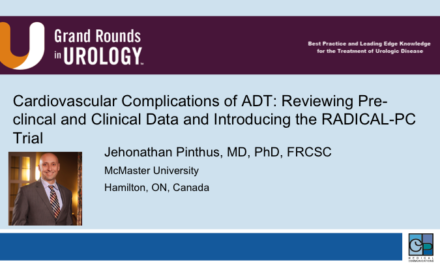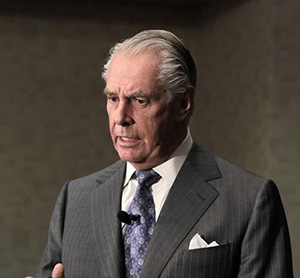Ted Schenberg presented “DNA Specimen Provenance Assay: Preventing Overdiagnosis of Prostate Cancer” during the 19th Annual Future Directions in Urology Symposium on August 11, 2018 in Colorado Springs, Colorado.
How to cite: Schenberg, Ted. “DNA Specimen Provenance Assay: Preventing Overdiagnosis of Prostate Cancer ” August 11, 2018. Accessed [date today]. https://dev.grandroundsinurology.com/dna-specimen-provenance-assay-preventing-overdiagnosis-of-prostate-cancer/
DNA Specimen Provenance Assay: Preventing Overdiagnosis of Prostate Cancer – Summary:
Ted Schenberg, CEO of Strand Diagnostics, explains how the DNA Specimen Provenance Assay minimizes adverse effects in cancer patients due to specimen provenance complications (SPCs) in biopsy reporting. He also discusses the UroSeq™ hereditary prostate cancer panel test, which Strand Diagnostics introduced earlier this year.
False Positive Biopsy Due to Clinical Error
In the United States, false positive diagnoses from cancer biopsies can lead to unnecessary radical treatment and cause significant issues. Often, these false positives are due to SPCs. Specimen switches or contaminations that occur in the clinic, transportation, or laboratory. The DNA Specimen Provenance Assay (DSPA), a component of the Know Error® system, can prevent adverse patient outcomes as a result of SPCs.
DSPA Data
Since August of 2017, when Schenberg last reported on this assay, buccal swabs of over 60,500 patients undergoing prostate biopsies underwent the DSPA test. Of those patients, about 26,000 had suspected prostate cancer. The DSPA revealed SPC issues in 573 patients. About 60 of these SPCs were due to switching of patient samples, and the rest were due to a sample contamination. These complications can consequently have profound negative effects on patient outcomes. Specimen contaminations can confound biomarker testing as well as biopsies.
UroSeq™
In addition to the DSPA, Strand Diagnostics introduced the UroSeq™ hereditary prostate cancer panel test this year. The UroSeq™ can use pathology reports and germline DNA samples from the buccal swabs taken for the DSPA. Therefore, patients do not have to provide another sample for this test, and report turnaround time is relatively fast. The UroSeq™ reposts on seven genes relevant to managing prostate cancer patients, including BRCA1, BRCA2, RAD51D, PALB2, ATM, CHEK2, and HOXB13. Finally, the UroSeq™ uses the DSPA to confirm that SPCs do not confound reports from this gene panel test.
About Ted Schenberg
Ted Schenberg is a successful veteran businessman who has founded and/or acquired several companies. Currently, he is the CEO of Strand Diagnostics, an FBI and CLIA-accredited forensic and medical DNA testing lab.
About the Future Directions in Urology Symposium
The Future Directions in Urology Symposium (FDUS) is an annual collaborative meeting with a faculty consisting of the top researchers, physicians, and educators in the field of urology. During FDUS, experts provide updates on recent developments and debate innovative management approaches in genitourinary cancers and urologic conditions. Subsequently, the experts devise consensus statements in accordance with the discussions held in the meeting.
In this video, Schenberg discloses the thesis of the discussion he led during FDUS.






